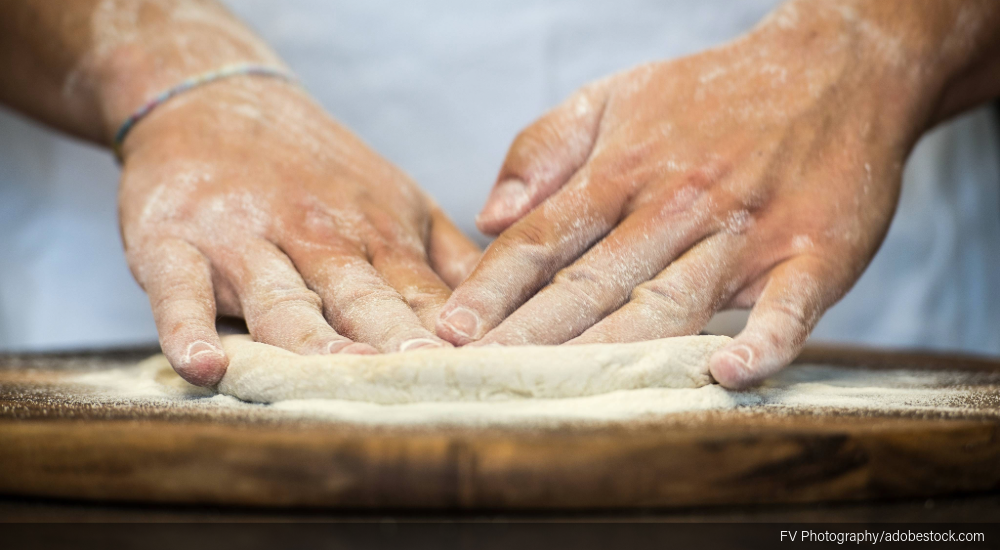Be the leader your pizzeria needs
While some are natural-born leaders, most leaders are made over years of intentional progress. Developing strong leadership traits and skills often gets lost in the weeds in the day-to-day operations of running a pizzeria. But, if you lock in on leadership, your business and your team will thank you.
David Scott Peters has spent decades as a renowned restaurant expert who teaches restaurant operators how to cut costs and increase profits with his trademark Restaurant Prosperity Formula. He has written extensively and coached restaurateurs on leadership. His first thought drives home the importance of leadership. “You must become the leader your restaurant needs,” Peters says. “Just because you own a restaurant doesn’t make you a leader. And that’s the important part to understand. Because I think the No. 1 reason why restaurants fail is lack of leadership.”
Common Pitfalls
The pitfall many operators make is relying on themselves to be everything. From dough making and cooking to order taking and catering, some operators position themselves as the best person for those jobs. “They’re the best, best, best, which they’ve now created a prison,” Peters says.
It is a hard habit to break. While small pizzerias require more hands-on roles, owners need to shift to their new role. “They don’t understand that their role is working on budgets, marketing, leading the team, developing their managers, holding people accountable, working strategically on the business and moving the company forward,” Peters says. “That’s what a leader does. We don’t actually do the things; we lead the process. We make sure people understand our vision, our why – (it’s) extremely important.”
Delegation becomes paramount to a restaurant leader. “The first thing is, they have to understand that anything they do for the most part, day to day, is a trainable task,” Peters says. “It’s a task I can train anybody to count a bar drawer. I can train somebody to make dough. … They also have to figure out the No. 1 challenge, and that’s learning to delegate successfully. Yes, delegation is the Achilles heel for any restaurant.”
There is a fine line between managing your employees and micromanaging. “As a leader, you’ve got to keep people moving forward, hold them accountable for those tasks. So, it’s delegation and accountability. That’s it. Man, those are the two hardest things,” he reiterates.
Two characteristics that Peters says separate successful restaurant owners are passion for the hospitality industry and persistence.
The linchpin to an effective leader lies in identifying and developing an “implementer” who can help execute on systems and processes, Peters contents. “You have to have a depth chart. You have to, as a leader, have a plan on who is next in line.”
Explore more leadership tips from Peters at PizzaToday.com:
- Culture at Its Core
- Two Food Cost Myths Hamstring Your Recovery
- The Get-along Gang
- Prime Cost Control
- Three Principles the Most Successful Pizzeria Owners Live and Breathe
Pizzeria Owners Discuss Leadership Traits
Three pizzeria industry thought leaders weigh in on key leadership traits an operator should have or should develop to increase success in the pizza business.
Mike Bausch, Andolini’s Pizzeria, Tulsa, Oklahoma
Bausch owns five pizzerias, two food hall concepts, a food truck and a fine dining restaurant. He is owner and creator of the Unsliced Restaurant System coaching program and author of the Amazon No. 1 best-selling book “Unsliced: How to Stay Whole in the Pizzeria Industry.”
Tact and Integrity
Bausch says he seeks to lead with “tact to know what to say and how to say it properly, and integrity that states, ‘I will always seek to do the right thing, no matter what.’ That breeds a sense of safety and security for everything else to transpire.”
Melissa Rickman, Wholly Stromboli, Fort Lupton, Colorado
Rickman is a frequent speaker at Pizza Expo and contributor to Pizza Today.
Self-discipline or Self Control
“I think a lot of people assume that because we are entrepreneurs, we are the picture of self-control, because we are hard workers, keep our eye on the prize and are driven to succeed. But I would submit that self-control is a big challenge for most of us,” Rickman says. “By way of example, there are things that we as restaurateurs think are going to be so detrimental to our brand that we have to stop a $3,000 sales hour to fix it – whether it be a pizza that isn’t executed to our brand standard, the bathroom trash is full, or there is a fork on the floor underneath a guest table because we didn’t sweep between guests. Those things seem so important that we have to interrupt the flow of business and take our team members away from what is most important to show them ‘how to do it right.’ Learning how to take a deep breath and find the discipline to say, ‘No, this is not perfect, but I will address it in the right place and time’ is crucial to being a good leader. Emotional intelligence, self-control, whatever you want to call it. Instead, try making a list of these things and talking about it with your managers in your weekly meeting.”
Patience
“A lot of us move at 100 miles an hour,” Rickman says. “We have a full-on circus and monkeys running around in our heads and the only way to quiet them is to get shit done! Have an idea? Let’s make it happen! The sense of urgency is real, and it can lead to the overwhelm of your team, your partner and anyone else who is close to you. We also suffer from, ‘I can do it myself better and faster’ syndrome! If I ask someone to do something, I expect them to do it now! If I don’t see action right away, I get nervous, then because I don’t want to badger them, I either do it myself or get grumpy about it or, even worse, ask someone else to do it. The fact is that your team is busy, they have many competing projects, tasks and your team and guests to take care of. Just because you are impatient does not mean they need to drop everything and get the thing done. These two behaviors are the key factor in burning out your team and managers because they start to wonder why you need them at all if you’re just going to be all up in their Cheerios! I can speak from experience, because this was me for many years. These were the most impactful changes that I made as a leader and the hardest habits to break …”
Bill Crawford, Righteous Slice, Rexburg, Idaho
Crawford’s experiences as an Air Force fighter and bomber pilot, Harvard Business School graduate and professor of business management give him a unique perspective on how to succeed in the pizza business.
Humility
“Being willing to hear the hard truth, accept it and change yourself is my No. 1 leadership trait,” Crawford says. “It may seem counterintuitive, but all learning and progress begins with humility. Without it, leaders will be blind to their need to change, which in turn keeps them from learning from their experiences. Humble leaders invite others to join them in learning and improving.“
Accountability
“I try to always remember that everything that goes wrong is my fault. When I see a team member who is not following our standards, instead of criticizing or blaming them, I first ask myself, ‘What have I done to make sure they are successful? Do I have the right standards in place? Is my training program appropriate for the position and skill level of the employees?’” Crawford says.
“That doesn’t mean that I don’t expect high performance from everyone on my team. It means I hold myself accountable first to making sure that my team has the resources and training required to be successful. Once we have standards, systems and processes in place, then we can hold everyone accountable to follow them. This allows me to have high trust and confidence in my team, which reduces my stress and actually enables me to have a higher quality of life in and outside of the pizzeria.”
Empathy
Crawford advocates “seeing the world through your employees’ and customers’ eyes. Leaders with high empathy recognize what it’s like for their team members to be on the line, have personal challenges and goals. Recently, our manager struggled to publish schedules on time while working 50+ hour weeks and being short-staffed. Instead of criticizing him, I asked what was getting in the way. Understanding his challenge of juggling line work with management duties allowed me to help him work more efficiently. The result was better performance and a stronger relationship.”
Positivity
“The leader sets the tone for everyone else,” Crawford says. “Being positive lifts spirits, makes work fun and helps everyone on the team perform at a higher level.”
Denise Greer is Executive Editor at Pizza Today.
Read the October 2025 Issue of Pizza Today Magazine
It’s National Pizza Month! We’re celebrating all month long with pizzeria community impact stories. See how pizzerias are making a difference in their communities. The inaugural Pizza Expo Columbus takes over the Columbus Convention Center on Oct. 26-27. Get a preview of all the excitement to expect. In this issue, we also dive into what makes the perfect pepperoni slice and breakfast pizza inspiration. Find tips leadership traits and how to maximize user-generated content. Go to the October issue.




